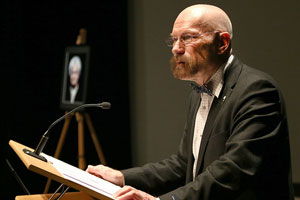
Professor Rainer Schulze speaking at this year's Dora Love Prize evening
Bergen-Belsen “was not a name one ever forgot and became a place of horror long before Auschwitz.”
This is how playwright Alan Bennett remembers the images of the liberation of Bergen-Belsen which he saw in 1945 as an 11-year old boy in the newsreels shown at the Playhouse cinema on Guildford High Street.
Professor Rainer Schulze from the University of Essex will explore why these images had such a lasting impact in Britain as part of the official conference held in Germany to mark the 70th anniversary of the concentration camp’s liberation.
Bergen-Belsen was the first main concentration camp which fell into British hands, and the troops were completely unprepared for what they uncovered on 15 April 1945.
A team of the British Army Film and Photographic Unit began documenting the conditions in full by photographs and film on the following morning, producing a large collection of what constitutes some of the most moving and at the same time distressing images of the Second World War. It is these images which have become so deeply engrained in public consciousness – particularly in Britain.
The conference will trace the end of World War Two in Lower Saxony, the liberation of Bergen-Belsen and its long shadow. It will be held in Hannover – the capital of Lower Saxony, the German state in which Bergen-Belsen is located, on the day of the anniversary, 15 April.
Professor Schulze will discuss how the position of Bergen-Belsen has developed within British and German cultural memory since 1945 and what role it plays today in the European memory landscape. In the dominant British narrative as it slowly evolved, Bergen-Belsen became the Nazi horror camp par excellence, universalised and de-individualised. The liberation of Bergen-Belsen was transformed in British collective memory into a triumph in the British battle against Nazi Germany: ‘Britain’s finest hour’.
Professor Schulze said: “The images of Bergen-Belsen confirmed to the wider British public that the British Army had fought a morally and ethically justified war, and that all the personal and collective sacrifices made to win the war had been vindicated: the liberation of Bergen-Belsen came to embody everything Britain had fought for in the Second World War.
“In contrast, Germany and within the immediate area around Bergen-Belsen itself, there was a long period of silence and of concealing the memory of what happened until the history of this place slowly started to reemerge and be remembered again .
“Bergen-Belsen is still a site of competing and conflicting narratives. Different groups have different memories of Bergen-Belsen which have evolved over time, and there were points when these memories seemed almost incompatible.”
The conference is organised by the Foundation for Lower Saxony Memorials, the German War Graves Commission, the Education Association for Work and Life of Lower Saxony, the European Information Centre and the Lower Saxony Ministry of Education.
Full details (in German) are here: www.volksbund.de/nc/niedersachsen/aktuelles/meldungen-detail1/artikel/-201ecdd2f9.html
Professor Schulze is Professor of Modern European History at the University of Essex and a Member of the Human Rights Centre. His research has focused on the history of Bergen-Belsen and the history of genocides and forced migrations in twentieth-century Europe. From 2000 to 2007 he worked as one of the project leaders for the international team of researchers preparing a new permanent exhibition at the Gedenkstätte Bergen-Belsen. In 2005 he became a member of the International Experts' Commission for the Redevelopment of the Gedenkstätte Bergen-Belsen, the only representative from the United Kingdom.
He was one of the historical consultants on André Singer's acclaimed documentary Night Will Fall (2014) and on the recently restored and completed historical documentary German Concentration Camps Factual Survey (1945/2014).
He is the co-ordinator of the annual Holocaust Memorial Week at the University of Essex and of the Dora Love Prize, and the founding editor of the journal The Holocaust in History and Memory. The latest edition of the Journal will be released next week.
For more information about The Holocaust in History and Memory go to: www.essex.ac.uk/history/journal_thhm/volume_7.html